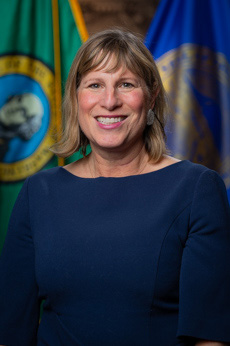
Tacoma City Council member joins state pipeline safety committee
Listen
(Runtime 1:00)
Read
Twenty-five years ago, the Olympic Pipeline ruptured in Bellingham, Washington, killing three people. In the aftermath, Washington state created its Citizens’ Committee on Pipeline Safety, meant to advise on regulation to keep communities around pipelines safer.
The committee still functions today, but Amanda McKay, who serves on it, said that increased interest and awareness of pipeline safety issues in the early 2000s has now fallen. Groups that advocate for pipeline safety and regulations, like hers, want to change that.
“Awareness has really gone down around pipelines in general and pipeline safety,” said McKay, who also works for the Pipeline Safety Trust, an organization that advocates for more public education about pipelines. “Right now, we are really trying to build the committee back up, we’re trying to gain more members on the committee who are interested in pipeline safety issues in and around their communities.”
There are meant to be nine voting members on the committee, but three seats are currently vacant, with one opening soon. Two of the vacant seats would be filled by members of the general public.
Tacoma City Council member Sarah Rumbaugh is the latest appointee to the committee. Rumbaugh’s district includes the Port of Tacoma, where the Williams Northwest Pipeline travels from Canada and brings natural gas into the Puget Sound Energy liquified natural gas facility. That pipeline falls into the category of intrastate pipeline the committee focuses on.
“I care a lot about the safety of my neighborhood and all of Tacoma because we are surrounded by the Port of Tacoma,” Rumbaugh said. “These are issues that we have to look at, but we have to balance it with the environment, and also economics, because we understand how significant the Port of Tacoma is to the economics of the region.”
Members of the committee serve three-year staggered terms. So far this year, Rumbaugh and two other new members have been appointed. Rumbaugh noted how there are no tribal members on the committee, something she would like to see change.
“How do we add equity to this so that we have every voice in the room rather than just what we’ve always thought is who should be at the table?” Rumbaugh said.
There are no federal or state laws on easements for pipelines — only the city and the county can regulate that. So, Rumbaugh said she will be able to take what she learns at the state level back to her work in Tacoma.
For the committee, McKay said legislative priorities for the coming year haven’t been set yet. However, awareness will be a big focus, as there are numerous gas distribution and transmission pipelines running through the state.
















